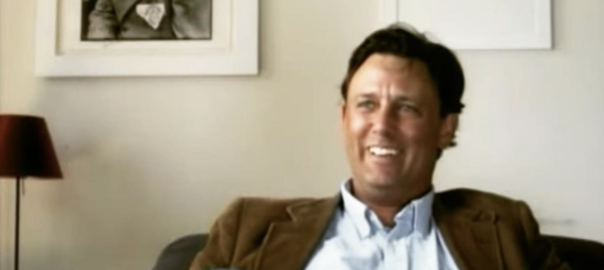I’ve been writing about Chuck Verrill’s work as the editor of IT these past weeks in my PhD, so I thought I’d take the time to express my appreciation here for Stephen King’s long-time editor, agent, and friend. Verrill passed away a little over a year ago, on the 9th of January 2022.
King first met Verrill as the assistant to Alan Williams, King’s first editor at Viking, who edited The Dead Zone (1979), Firestarter (1980), Cujo (1981), Different Seasons (1982), Christine (1983), and The Talisman (1984), before leaving Viking for Putnam. Williams’ exit meant a promotion for Verrill at Viking, and I believe IT might have been the first King novel that Verrill edited—the first of many.
King later recalled meeting Verrill:
[W]hen I moved to Viking I had an editor named Alan [Williams] and his assistant was a guy named Chuck Verrill and at that time Chuck was answering phones and doing memos. He’s like a boy, that’s how young he looked. Alan moved somewhere or retired, I can’t remember which, and Chuck started to edit the books. There was some discussion at the time because he was young, and I said: “Chuck’s OK.” So Chuck and I have been together since about 1988 or something. It’s going on 30 years now. So he’s not afraid of me, he knew me when, so to speak, and he’s a great concept editor and he’s a great line editor.1
So far, I haven’t been able to find any details on when King signed a contract for IT—there were no announcements in the trade press to my knowledge—but I believe it must have been in 1983. There is a photocopy at King’s archive of his first draft of IT that has many handwritten comments by Verrill in the margins. I believe King sent the copy not long after Viking had bought the hardcover rights, because he wanted his newly appointed editor’s opinion before he undertook his second draft.
It’s obvious from Verrill’s comments that he liked the novel very much. There are edits and queries on 307 of the 1147 pages of the draft. Verrill flagged repetitions, redundancies, and overused words, phrases, and events; he questioned potential weaknesses or errors in the narrative logic of some events or of the characters’ thoughts, emotions, and motivations; he pointed out opportunities to highlight themes; and he suggested cuts and trims here and there. He asked King some tough questions, why it is, for instance, that Stan Uris is the first person that Mike Hanlon calls. When King officially submitted IT to Viking for publication in early 1986, Verrill went through the text (in its third draft form) with great attention to detail. IT was a challenge, with its hundreds of characters and many dates.
Authors often have a love/hate relationship with their editors, love turning to hate when they receive their text back from their editor filled with questions, comments and suggestions for cuts and changes. King talked about his collaborations with Verrill along these lines in an interview in 1993:
I want an editor that’s fairly tough on me. I’m in the process of rewriting a book now and I’ve got a manuscript that’s covered with line edits. The editor’s name is Chuck Verrill. He’s very very good and at this stage in the manuscript, I could kill him. […] He won’t let me be Stephen King. That’s the most important thing. […] He will not let me be a Macy’s Thanksgiving Day Parade Float, you know, a big, inflated cartoon figure. […] He’ll change plot developments, and sometimes suggests that a lot of stuff should be switched around. The most valuable thing, from my standpoint is: he will cut what I’ve written. Because I have a tendency to write long. […] [Making the cuts] always hurts. It always hurts.
The complete interview is available on YouTube:
Verrill edited all of the novels King published with Viking from IT onwards, and, on a freelance basis, many of the novels published by Scribner. You can find references to Verrill all throughout King’s work. In Misery (1987), Paul Sheldon meets up with his editor, Charlie Merrill. King dedicated Secret Window, Secret Garden (1990) to Verrill. The Editor’s Note at the front of The Regulators (1995) is signed “Charles Verrill of New York City”. Verrill also makes an appearance of sorts in The Dark Tower (2004), when King’s fictional self thinks: “He has promised himself that he’ll try not to stuff his Dark Tower fantasies with unpronounceable words in some made-up (not to say fucked-up) language—his editor, Chuck Verrill in New York, will only cut most of them if he does—but his mind seems to be filling up with such words and phrases all the same”.
King thanks Verrill in the “afterthoughts” to Duma Key (2008): “I also want to thank Chuck Verrill, who edited the book with his usual combination of gentleness and ruthlessness”. In Finders Keepers (2015), King added: “He’s been my go-to guy for thirty years, smart, funny, and fearless. No yes-man he; when my shit’s not right, he never hesitates to tell me.”
Verrill hasn’t given many interviews about his work with King, in fact you can hardly find any information about him on the internet at all. He was interviewed for the 1999 documentary “Stephen King: Shining in the Dark”, which you can watch in full on YouTube.
King posted about Verrill’s death on twitter. I suspect one of King’s following novels will include an homage to Verrill, as he did with his friend and research assistant Russ Dorr in the afterword to The Institute (2019).
- 1.Blackmore K. Interview with Stephen King. The Times: Stephen King Supplement. October 21, 2006:10.
